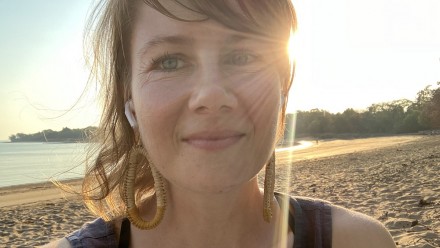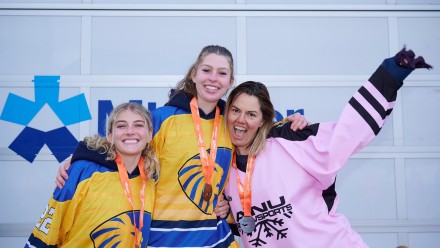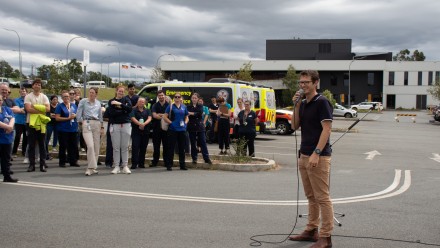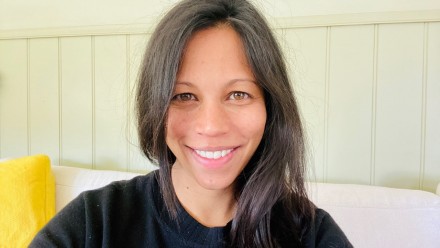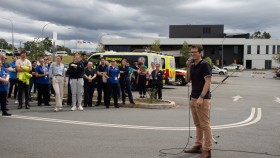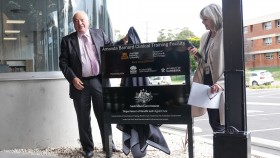When there's no playbook, flexibility, communication and empathy are key
By Dr Kirsty Rady
Hi everyone
My name is Kirsty – I’m a mum to a very cheeky two-year-old girl (and soon to a second little one!) and a doctor, living and working in Canberra. I trained in clinical and laboratory haematology and currently work across a range of roles, including clinical haematology, medical administration, and healthcare consulting. I love baking, drinking good coffee, spending time with friends and family and running – although these days I spend a lot more time re-watching episodes of ‘Bluey’ than I do running!
The COVID-19 pandemic has certainly been challenging and affected both my personal and professional life. I was a couple of months into maternity leave when the pandemic was declared. Luckily for me I have family who live locally, and in Canberra we were spared from a large early COVID wave and long lockdowns, so I had ongoing family support unlike many others. Things were trickier for my husband, who is from the UK and works in the event industry, which all but shut down overnight.
Given the significant changes within the hospital during the early stages of the pandemic, and all of the uncertainty, I came back to work in my administrative capacity (at a very small fraction) earlier than intended, when my daughter was only four months old. I was working within the junior doctor education and welfare team, and we had a lot to do! The pandemic has been challenging for the entire medical workforce. Within the JMO cohort we saw significant levels of stress and anxiety. Working hours increased as we battled with staff shortages, exams were cancelled and delayed, rotations stopped and people were not able to progress through training for some time. People couldn’t travel interstate to see friends and family; many felt isolated, many missed out on seeing loved ones when they were unwell. We saw a lot of burnout, fatigue and emotional distress.
The situation was new to all of us and there were no rules about how to deal with any of it. Within our team, we spent a lot of time developing an online education program to enable continuous education during the pandemic, re-working rosters, trying to maintain adequate cover in the face of enormous workforce shortages, contact-tracing and risk assessing the JMOs after COVID exposures, and providing welfare and support to those struggling. Our office very quickly became known as the place to drop in for a chat or some chocolate from the ‘welfare box’ (for JMOs and consultants alike). There was no answer to many of the challenges; we couldn’t fix the workforce shortages, we couldn’t give people the leave they wanted, we couldn’t open the borders…but we did what we could. We tried to communicat openly and honestly with the JMOs, and the hospital leadership. We tried to be available, we listened, we sought answers to their questions, and we were flexible. In hindsight, I’m sure there were many things we could have done better, but the whole situation was so unpredictable (and in a way it still is).
Have there been any silver linings? Absolutely! I believe the pandemic has taught us to be more flexible and to look after ourselves. In my education, welfare and support role the pandemic allowed us to offer a more flexible education program and improved access to online educational resources for the JMOs. It facilitated a culture of open communication and acceptance of flexible working arrangements. It gave us permission to stay at home and look after ourselves when we weren’t well.
In my clinical role, I believe the move to telehealth has improved access to care for those in rural and remote areas, reducing the need for patients to travel for every appointment.
For me personally, particularly in my healthcare consulting role, the acceptance of flexible working arrangements and remote working has been hugely positive. I work from home with a team of consultants from around Australia and have learnt that you don’t need to be in the room with someone to be productive and communicate effectively. The flexible working arrangements have also been fantastic for me with a young daughter, navigating childcare drop-offs, pick-ups and sick days!
My message to others in healthcare (women and men alike) is to follow your passion, love what you do, trust your decisions and don’t be afraid to take a risk and try something new. A career in medicine is exciting, stimulating, fulfilling, and at times, difficult and exhausting! Always remember to talk about how you feel – the things you love, the things you don’t, the patients that impact you, and anything you find distressing. Communication and reflection is key. Medicine certainly requires hard work and dedication, but always remember this is just one element of your life – don’t forget to make time to switch off and have fun, see your friends, and prioritise your family, – this will make you a better (and happier) doctor!





